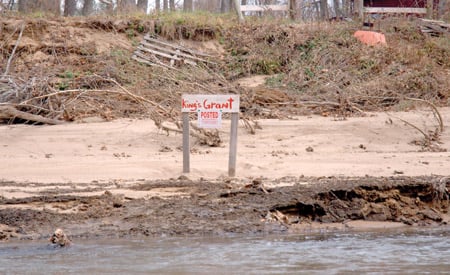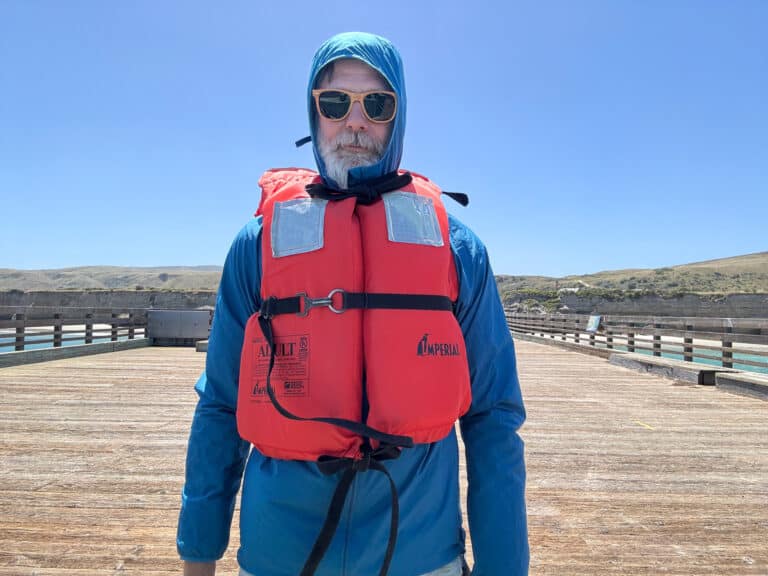The confluence of the Hazel and Thornton Rivers has historically been a gathering place for swimmers, canoeists, anglers—and even occasional baptisms by one local church. Then, in September 2005, Gary Close, Culpeper County’s former attorney, decided to close off the river to public use, igniting a firestorm of protest.
Close based his decision on the riparian landowners’ claims of a pre-Revolutionary grant to the river. King’s (or Crown) grants were issued by monarchs to reward loyal subjects with colonial property. At one time, nearly all of Culpeper County was part of such a grant. In 1802, however, the Virginia General Assembly passed a law stipulating that all land under water that was not previously conveyed would henceforth be held by the Commonwealth of Virginia in trust for the public.
The landowners along the Hazel had argued to Close that because their land was conveyed before 1802, the law didn’t apply to their property. Now, the Virginia Attorney General’s Office contends that a Crown grant is not recognized until it has been adjudicated by a Virginia court. No such case has ever been litigated on the Hazel River.
Close determined that it was illegal to tread on the river bottom—and to float and swim in the area, despite state and federal law to the contrary. On the basis of Close’s actions, landowners routinely summoned law enforcement hundreds of times to expel citizens from the river.
After a great deal of public pressure, Close agreed to review his original position and found that he had been wrong to recognize the Crown grant in the absence of judicial review. The public can now use the river near the low-water bridge, although walking on the privately owned riverbanks is still forbidden by law.
Locals have harshly criticized the riparian landowners’ actions in the imbroglio, but the truth is that they have some legitimate concerns. Culpeper County court records document dozens of criminal trespassing convictions—and convictions for everything from littering to illicit drug use—along the riverbanks. There is evidence of illegally harvested deer carcasses, their remains unceremoniously dumped on Butler Store Road not far from the river. One riparian landowner claims that a stranger walked right into his home to ask where he could fish. Swimming and fishing in the river is legal; trespassing and littering are not.
Old news, you say? Think again. In a new wrinkle to the never-ending Hazel River drama, landowner Ben Grace is objecting to the removal of the defunct Monumental Mills Dam, which originally supported a gristmill but hasn’t operated for decades. Jean Scott, the dam owner and a riparian landowner from the other side of the river, contacted Virginia Department of Game and Inland Fisheries (VDGIF) officials to see if she could have the dam removed. Scott argues that the dam serves no useful purpose today, is an eyesore and a health hazard, and blocks multiple species of migrating fish, including river herring and shad.
Paddlers in particular are adversely affected by the dam: They cannot portage on Mrs. Scott’s side of the river because of a sheer drop-off of about 20 feet. Meanwhile, the other side of the dam, which still houses part of the old gristmill, is clearly labeled “no trespassing” and references a King’s grant. The state has secured funds to have the dam removed at no cost to either landowner, but Mr. Grace has strenuously objected to state workers coming on his side of the river to remove the dam. Indeed, he has served numerous state employees with “stay-away notices” informing them that he may press charges against them for trespassing should they return.
Freedom of Information Act requests reveal that the state has engaged a title company to research the King’s grant claims at $75 per hour. At this writing, the agency has spent $11,653 looking into the matter. The project, however, appears to be at a standstill. Other FOIA requests indicate that state employees feel unsafe and intimidated while working in the area and have even requested that armed Conservation Police Officers accompany them for further work. The Culpeper County Board of Supervisors unanimously voted to support the removal of the dam, and at least one riparian landowner downstream of the dam has offered to donate property to establish a canoe launch area when the dam is finally removed.
The Hazel River may be a hotly contested river bottom—but it isn’t the only one. Anglers across the Old Dominion are incensed by state officials who advertise local waters as public property and merrily sell fishing licenses—and then refuse to defend anglers in court when they are sued by riparian landowners who claim to hold an exclusive grant to the river bottom. The Crown grant issue cries out for clarity, but thus far only State Delegate Scott Lingamfelter (R-31) and State Senator Creigh Deeds (D-25) have made any attempt to address it. In the last legislative session, Del. Lingamfelter proposed a bill that would have required landowners to notify state agencies of pending river bottom claims and to post publically where such claims originated; that bill died in committee. This step would have at least provided some clarity for river users.
Will Mark Herring, the Old Dominion’s new Attorney General, defend the rights of canoeists, anglers, and swimmers to traverse Virginia’s public waterways? Only time will tell.








